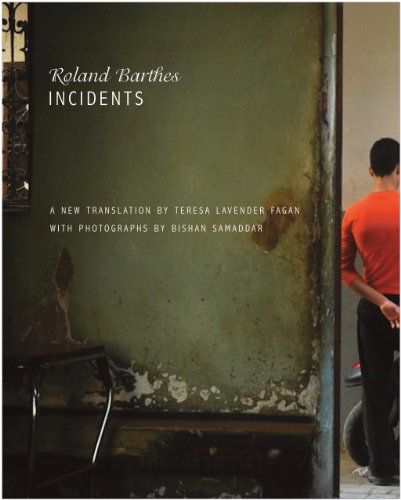At the start of the year, a friend asked how I choose the books I want to read. He explained that he consulted reviews, bestseller lists, prize nominations, end-of-year lists, then compiled a detailed spreadsheet, and proceeded to read as many books as he could over the course of the year. My own method—if it can be called that—is the opposite of systematic. It’s almost as if the books I read choose me. I hear about a book from a friend or on the radio. A writer I like mentions another writer, and my interest is piqued. Or, as was the case with the first book I read in 2021, it might have been sitting patiently on my shelf for years, waiting its turn.
After our year of entrapment and fear, Roland Barthes’s Incidents felt right. A book of elsewheres and movement, of yearnings for the ineffable, Barthes’s journal-like writing is interspersed with haunting photographs by Bishan Samaddar. These lines stay with me: “Because ‘to read’ a land is first to perceive it through one’s body and memory, through the memory of one’s body. I believe the writer exists in this vestibule of knowledge and analysis: having more awareness than experience, aware of the very cracks in experience. This is why childhood is the anointed road on which we can best know a land. In the end, there is no Land other than the Land of Childhood.”

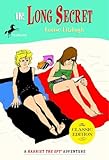 So that’s where I head next. Back to Louise Fitzhugh’s Harriet the Spy and The Long Secret, sitting on my bedside table with 10 or so other books I like to keep close: talismans. Though I mention Fitzhugh’s titles often when asked what books meant the most to me as a child, I haven’t actually read them in years, maybe decades. Reading them again, they remind me of who I’ve always been. Did Harriet make me? Or was I attracted to Harriet because I so completely identified with her? A child in Kuwait who dreamed of being a child in New York City, claiming the wild freedom personified by that place. After our hell year, as a result of which I’ve come a little undone, these books take me back to my own Land of Childhood, when “pandemic” and “climate crisis” meant nothing at all.
So that’s where I head next. Back to Louise Fitzhugh’s Harriet the Spy and The Long Secret, sitting on my bedside table with 10 or so other books I like to keep close: talismans. Though I mention Fitzhugh’s titles often when asked what books meant the most to me as a child, I haven’t actually read them in years, maybe decades. Reading them again, they remind me of who I’ve always been. Did Harriet make me? Or was I attracted to Harriet because I so completely identified with her? A child in Kuwait who dreamed of being a child in New York City, claiming the wild freedom personified by that place. After our hell year, as a result of which I’ve come a little undone, these books take me back to my own Land of Childhood, when “pandemic” and “climate crisis” meant nothing at all.
 Next comes Amitav Ghosh’s The Great Derangement: Climate Change and the Unthinkable because the climate crisis—evidence of which I see outside my window every day in the form of yellow-gray smog—is the principal planetary urgency. Ghosh is a masterful writer and thinker, a gift to the world, and this stunning book, which I couldn’t put down, forces us to think the unthinkable because the alternative is annihilation.
Next comes Amitav Ghosh’s The Great Derangement: Climate Change and the Unthinkable because the climate crisis—evidence of which I see outside my window every day in the form of yellow-gray smog—is the principal planetary urgency. Ghosh is a masterful writer and thinker, a gift to the world, and this stunning book, which I couldn’t put down, forces us to think the unthinkable because the alternative is annihilation.
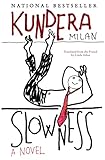 Then I am drawn to Milan Kundera’s Slowness, which I’ve read before but have forgotten. The title seduces me. It, too, like Ghosh’s book, is an indictment of our contemporary blindness, our need for speed, activity, fame, and commodities. Slowness, in contrast, cultivates secrecy, discretion, anonymity—forgotten pleasures.
Then I am drawn to Milan Kundera’s Slowness, which I’ve read before but have forgotten. The title seduces me. It, too, like Ghosh’s book, is an indictment of our contemporary blindness, our need for speed, activity, fame, and commodities. Slowness, in contrast, cultivates secrecy, discretion, anonymity—forgotten pleasures.
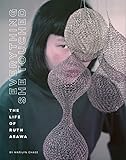 At the same time, I also read Marilyn Chase’s beautifully composed biography Everything She Touched: The Life of Ruth Asawa. It is aligned with Kundera’s notion of slowness because Asawa’s delicate, powerful sculptures and presence connote the opposite of speed and greedy consumption. I am moved by her persistence and her impeccable ethics, not to mention her remarkable, singular art.
At the same time, I also read Marilyn Chase’s beautifully composed biography Everything She Touched: The Life of Ruth Asawa. It is aligned with Kundera’s notion of slowness because Asawa’s delicate, powerful sculptures and presence connote the opposite of speed and greedy consumption. I am moved by her persistence and her impeccable ethics, not to mention her remarkable, singular art.
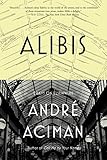 I pick up André Aciman’s Alibis: Essays on Elsewhere, and his description of reading as a teenager in Rome reminds me of my own practice of reading as a teenager in Kuwait: “In that room on Via Clelia, I managed to create a world that corresponded to nothing outside it. My books, my city, myself. All I had to do then was let the novels I was reading lend their aura to this street and drop an illusory film over its buildings, a film that washed down Via Clelia like a sheet of rainwater, casting a shimmering spell on this hard, humdrum, here-and-now area of lower-middle-class Rome.” I did that, too, in my room off Ali Bin Abi Talib Street.
I pick up André Aciman’s Alibis: Essays on Elsewhere, and his description of reading as a teenager in Rome reminds me of my own practice of reading as a teenager in Kuwait: “In that room on Via Clelia, I managed to create a world that corresponded to nothing outside it. My books, my city, myself. All I had to do then was let the novels I was reading lend their aura to this street and drop an illusory film over its buildings, a film that washed down Via Clelia like a sheet of rainwater, casting a shimmering spell on this hard, humdrum, here-and-now area of lower-middle-class Rome.” I did that, too, in my room off Ali Bin Abi Talib Street.
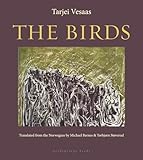 I read The Birds by Norwegian writer Tarjei Vesaas because I am a little obsessed with birds and with Norway, a place I’ve never been, an oil-producing country like my own, which seems to have done so much better with the blessing-curse of it. The book is breathtaking, quietly devastating, ominous from beginning to end.
I read The Birds by Norwegian writer Tarjei Vesaas because I am a little obsessed with birds and with Norway, a place I’ve never been, an oil-producing country like my own, which seems to have done so much better with the blessing-curse of it. The book is breathtaking, quietly devastating, ominous from beginning to end.
 Tsitsi Dangarembga’s This Mournable Body follows, and I devour it. The first installment of Dangarembga’s trilogy, Nervous Conditions, is a book I teach often, and the characters Tambudzai and Nyasha are, for me, alive. Dangarembga is a sharp writer, and I love that she takes her time with her novels. I’m thrilled this one was longlisted for the Booker Prize.
Tsitsi Dangarembga’s This Mournable Body follows, and I devour it. The first installment of Dangarembga’s trilogy, Nervous Conditions, is a book I teach often, and the characters Tambudzai and Nyasha are, for me, alive. Dangarembga is a sharp writer, and I love that she takes her time with her novels. I’m thrilled this one was longlisted for the Booker Prize.
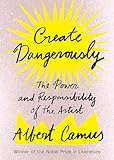 I read Camus’s Create Dangerously: The Power and Responsibility of the Artist, which is a tiny book, an essay, really, and it resonates with Ghosh’s thesis about the role of the artist/writer in the era of climate catastrophe. Concealing, obfuscating, ignoring are no longer options, if they ever were. “To create today means to create dangerously,” Camus writes. “Every publication is a deliberate act, and that act makes us vulnerable to the passions of a century that forgives nothing.” We should not expect forgiveness in this century either—we writers, we humans. We must inhabit our vulnerability (accountability) with grace.
I read Camus’s Create Dangerously: The Power and Responsibility of the Artist, which is a tiny book, an essay, really, and it resonates with Ghosh’s thesis about the role of the artist/writer in the era of climate catastrophe. Concealing, obfuscating, ignoring are no longer options, if they ever were. “To create today means to create dangerously,” Camus writes. “Every publication is a deliberate act, and that act makes us vulnerable to the passions of a century that forgives nothing.” We should not expect forgiveness in this century either—we writers, we humans. We must inhabit our vulnerability (accountability) with grace.
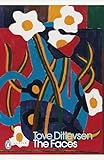

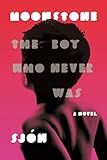 Summer arrives, and I read Amor Towles’s A Gentleman in Moscow, because the premise of being under house arrest in a hotel attic in Moscow carries a strange pandemic appeal. Then Annie Ernaux’s The Years, a memoir without the first-person—a revelation. Followed by Tove Ditlevsen’s The Faces, about a woman who suffers a psychic break, narrated with such precision and startling images that I can only read a few pages at a time. Then Maggie Nelson’s The Argonauts—part memoir, part academic meditation—another book that has been sitting on my shelves for too long. And Sjón’s Moonstone: The Boy Who Never Was, which I heard about on NPR some time ago, forgot about, then remembered again. I wasn’t expecting the 1918 flu to feature, and reading about it felt oddly soothing, though I’m quite certain that wasn’t the intent.
Summer arrives, and I read Amor Towles’s A Gentleman in Moscow, because the premise of being under house arrest in a hotel attic in Moscow carries a strange pandemic appeal. Then Annie Ernaux’s The Years, a memoir without the first-person—a revelation. Followed by Tove Ditlevsen’s The Faces, about a woman who suffers a psychic break, narrated with such precision and startling images that I can only read a few pages at a time. Then Maggie Nelson’s The Argonauts—part memoir, part academic meditation—another book that has been sitting on my shelves for too long. And Sjón’s Moonstone: The Boy Who Never Was, which I heard about on NPR some time ago, forgot about, then remembered again. I wasn’t expecting the 1918 flu to feature, and reading about it felt oddly soothing, though I’m quite certain that wasn’t the intent.
Currently I’m rereading J. M. Coetzee’s Life & Times of Michael K. This too is a random choice, plucked off my alphabetically ordered shelf as I was re-shelving Anton Chekov’s Stories, some of which I also reread this year (“The Death of a Clerk,” “Vanka,” “A Boring Story,” “In Exile,” “The House with the Mezzanine,” “Gooseberries,” and more). I’m reading Coetzee’s novel as if for the first time, and it’s like breathing in icy air, clearing away layers of stifling debris. It’s all here: colonialism, racism, classism, a parent-child relationship, violence, resilience. It forces us to ponder, in this hard moment, the inevitable outcome of centuries past, the pressing question: What are the parameters of a dignified life?
In this year of reading, it is that question, I think, that my trail of books—haphazard and circuitous—has been leading me through, opening up all kinds of unexplored possibilities, for which I am grateful.
More from A Year in Reading 2021 (opens in a new tab)
Don’t miss: A Year in Reading 2020, 2019, 2018, 2017, 2016, 2015, 2014, 2013, 2012, 2011, 2010, 2009, 2008, 2007, 2006, 2005
